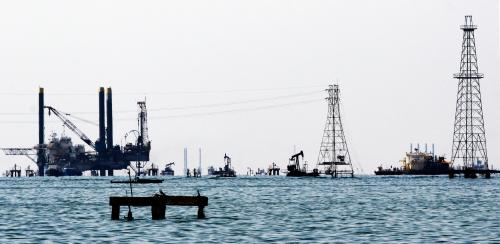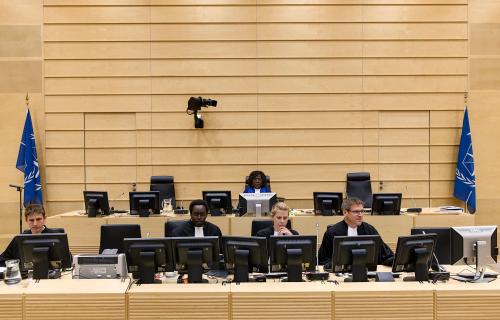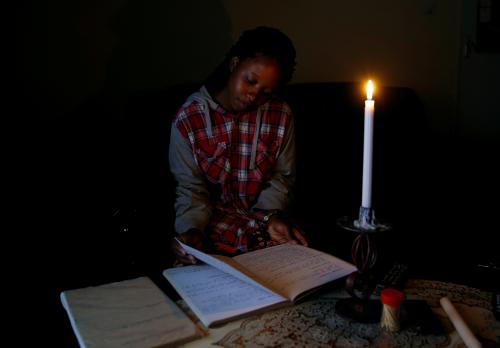IMF and World Bank reports predict improved economic outlook for Africa in 2017
Tuesday morning, the International Monetary Fund released its flagship report, World Economic Outlook, April 2017: Gaining Momentum?. The report forecasts an increase in global economic growth from 3.1 percent to 3.5 percent in 2017 and 3.6 percent in 2018. The report attributes the upsurge in economic activity to an increase in trade and manufacturing, and buoyant financial markets. Developing nations are predicted to expand by 4.5 percent this year and 4.8 percent in 2018, compared to the 4.1 percent growth in 2016. The IMF cites the increase in commodity prices as one of the reasons behind the improved outlook for emerging economies. The outlook for sub-Saharan Africa reflects that of emerging and developing markets. GDP growth is projected to increase to 2.6 and 3.5 percent in 2017 and 2018, respectively, from 1.4 percent in 2016. Economic activity will pick up in Nigeria and South Africa. After a 1.5 percent contraction, Nigeria’s economy is predicted to grow by 0.8 percent in 2017 and 1.9 percent in 2018. The growth in Nigeria’s economy is attributed to a recovery in oil production, continued growth in agriculture, and higher public investment. Amid improved drought conditions and the expansion of the country’s electricity generating capacity, South Africa’s growth rate will improve to 0.8 percent in 2017 and 1.6 percent in 2018 from 0.3 percent in 2016.
Also this week, the Office of the Chief Economist for the Africa Region at the World Bank released the April 2017 volume of Africa’s Pulse. The report predicts a growth rate of 2.6 percent for 2017. The report states that the improvement in economic activity is rather weak as the increase in investment will be gradual amid the tight foreign exchange liquidity conditions in oil-exporting countries, and low investor confidence in South Africa. Still, growth in non-commodity exporting countries—e.g., Ethiopia, Senegal, Tanzania, Cote d’Ivoire, Rwanda and Mali—will remain robust, supported by domestic demand. The report also cites the threats to economic recovery in the region. They include the rise in the protectionism from advanced economies, political uncertainty amid upcoming elections, rising debt levels and increasing security threats. This edition of the report focuses on infrastructure in sub-Saharan Africa.
For more information on Africa’s Pulse please read the piece by AGI Research Analyst and Project Coordinator Amy Copley titled Figures of the week: Africa’s Pulse highlights the region’s infrastructure gaps.
U.S. senators visit refugees in Uganda and call for food aid reform
Last weekend, U.S. Senators Bob Corker (R-Tenn.) and Christopher Coons (D-Del.) were in Africa, visiting the Bidi-Bidi refugee camp in Uganda, recently announced the largest in the world with at least 270,000 refugees from South Sudan. The senators focused largely on improving the provision of food aid to the camps and region, especially as famine intensifies in nearby South Sudan and Somalia (as well as in Nigeria and Yemen), threatening 20 million people with starvation.
The senators, both of whom serve on the Senate Foreign Relations Committee, had strong words for their colleagues in the U.S. government. Corker has blamed a “‘cartel in Washington’ of maritime companies and ‘a small group of people in Washington’ who cause less people to eat.” Both senators argue that eliminating some U.S. food aid restrictions (e.g., that it must be grown in the U.S. and shipped under the U.S. flag) could increase the amount of aid delivered while reducing delivery costs—which would increase access to food aid to an additional 2 million to 4 million people. The senators proposed ending these restrictions last year in the Food for Peace Reform Act of 2015.
This trip took place as the larger fight over the next U.S. budget looms. In 2015, the U.S. spent $2.8 billion on food aid, but the Trump administration’s budget calls for a 28 percent cut for both foreign aid and diplomacy, including the Food for Peace program.
Kenya’s Supreme Court orders government to comply with two-thirds gender rule
Last week, Kenya’s Supreme Court ruled that national legislators have 60 days to ensure that no more than two-thirds of parliament is comprised by one gender—as required in the country’s 2010 constitution—or face dissolution. The ruling follows a lawsuit brought by human rights groups over the government’s failure to comply with this mandate, since women currently fill just 69 of the country’s 349 seats in Parliament. Current proposals to meet the two-thirds rule are weak with one lawmaker calling to defer the issue until 2037 and another suggesting that winning parties nominate women to parliament after the election. Neither proposal addresses the under-representation of women in government within the timeframe stipulated by the Supreme Court. This week, however, High Court Judge Enoch Chacha Mwita loosened this initial deadline to give political parties six months to comply with the order, stating, “I do not see how political parties can be made to rework their nominations to comply with the two-thirds gender principle. But for avoidance of doubt, this order shall not apply to the General Election of August 8.”
In related news, Kenya’s major political parties held primaries this week amid calls from President Uhuru Kenyatta in a televised address to the public to abstain from violence and reject “a culture of hooliganism during the electoral process.” Kenya’s opposition coalition aimed to conclude its primary process this week although accusations over vote rigging and logistical issues in several counties led some elections to be postponed. The ruling Jubilee coalition is scheduled to start its primaries today.
Brookings Nonresident Senior Fellow Vera Songwe appointed executive secretary of the Economic Commission on Africa
In Brookings news, United Nations Secretary-General António Guterres appointed Brookings Nonresident Senior Fellow Vera Songwe executive secretary of the U.N. Economic Commission on Africa (UNECA). Songwe, who is currently the International Finance Corporation’s regional director for Africa covering West and Central Africa, has research interests in fiscal policy, innovative financing mechanisms for development, agriculture, energy, and economic governance, and has written extensively for AGI.
The Brookings Institution is committed to quality, independence, and impact.
We are supported by a diverse array of funders. In line with our values and policies, each Brookings publication represents the sole views of its author(s).








Commentary
Africa in the news: IMF and the World Bank revise Africa’s economic outlook, U.S. Senators Corker and Coons visit Uganda, and Kenya implements political reforms
April 21, 2017